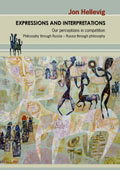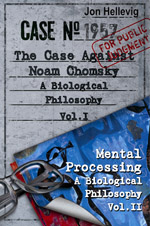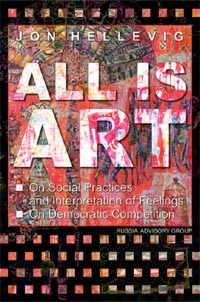|
|
| |
Wittgenstein
Building on Wittgenstein and Arriving at Expressions and Interpretations
Wittgenstein first said that �the world is the totality of facts, not of things� � his later work was a refutal of this idea, but he never reformulated his conceptual stance as such. In much drawing on his later arguments I would readjust that statement and claim that:
�The world is the totality of things. Life and understanding of the world and the things are determined by expressions and interpretations. The totality of expressions and interpretations determines whatever seems to be the case�.
The fundamental philosophical and scientific error is the failure to make a sharp demarcation between natural sciences and social sciences. Natural sciences study things and their movements, while social sciences (including philosophy) study expressions and interpretations. - Language is not a thing and the words are not things and the concepts are not things � language does not consist of any things � no atoms, no molecules and not even gaseous steam. � It is the delusion of the �language of things� that converts words into things. And once the things and expressions both are assigned the same roles in language then all the other errant conclusions are drawn from that.
Some authors have hinted at this problem, there has been talk about reification and the anthropomorphic fallacy, but the analysis has never reached deep enough. Upon noticing that expressions (words, language) are not things we should inquire into what is their actual essence. But there has never been such a concentrated analysis, and most importantly, no positive result has been provided. In this book I provide a solution, I claim that expressions are interpretations of feelings (note: this expressly means that they are not mirror images of something more fundamental, because there is nothing more fundamental).
When we understand that expressions are only interpretations of feelings (which are subject to further interpretations), then we have all the knowledge needed to make the other philosophical conclusions. � And thus there is no form, there are no laws, there is no causality, and there are no truths (apart from the true feelings) � naturally formal logic will be relegated to the role of linguistic alchemy.
Philosophy
From now on all social sciences should simply mean a historic study of a particular theme from a chosen perspective and argumentation for an ideal in regards to that. � The time of attempting to perform an autopsy on concepts, on words, is over � now a critical examination and evaluation will be directed to social practices, and individual deeds. � All social science will be understood as philosophy, philosophy as an activity to look after language, and a philosopher as a gardener of language � and it should be understood, that in fact this is all but art. (There is a nonsense book called Words and Things on hundreds of pages containing one sensible statement - and even that was meant as an irony - that the word and the deed is one).
Philosophy, as the study of language use, has to be freed from the constraints imposed by �the language of things� and the thinking it infects.
What emerges from my book is a very holistic picture where everything (all that is the case) can be seen as a dimension of a word. � And as this is so, then it follows that the usage of words, language, is what makes the social world go around � and then there cannot be anything more fundamental than looking after how language is used.
Philosophy and language are two aspects of the same issue. Philosophy should look after language and language is the basis for philosophy, while at the same time being the endless source for new philosophical problems (in this sense we indeed have philosophical problems: the endless practical problems caused by the weak thingly language). � These problems will never cease to exist � but we fight them in same way as we strive for health, we can get healthier, but there is never a cure.
In my work on jurisprudence I make use of these postulates: I am clearing up the ground on which language stands on [the misuse of legal language]; I am not saying anything else than propositions of natural sciences [words are not things; in law we can prove only the biological fact that the world ends at death]; I criticize all those philosophers, politicians and journalists that say something metaphysical [this is an endless task; we need a Foundation for criticism of everyday metaphysics]; I demonstrate how they fail to give a meaning to their propositions; Clarity is my method [I remove the metaphysical drapery of expressions and deal with what is left]; I am describing how language and hence social life functions [I am not promoting a view; I am not explaining how we came to this point � As Nietzsche does � because we simply do not know; we do not know how all evolved, but we now know the basics of how social life functions]; I promote the understanding that language is both the problem and the solution and philosophy should be the battleground [indeed battleground, not the forum for the bored book-learned self-proclaimed intelligentsia poking each other with sticks in between the eloquent praises for each other].
Nietzsche
I wanted to write more about Nietzsche, but due to my constraints to finish this work I will just confine myself to a few general comments. Nietzsche was the first scientific philosopher and rightly understood the mind as a dimension of the organic bodily needs. Nietzsche correctly wrote about consciousness; perceptions; logic; things; Kant; the life-aversive and corruptive force of the philosophy of antics, Socrates, Plato and all those warriors against the true world, the unveiling of this philosophy and subversion of the idols from the pedestals�But, it is an irony that the discoverer of the dimension of unconsciousness left his most valuable teachings in The Will to Power, i.e. in the writings he did not have published himself, - i.e. the scientific insight he knew but did not consciously stress in his published works - (apart from scattered remarks in the published works only in parts of the Twilight of Idols did he persuasively demonstrate his scientitific insight). - Unfortunately he is on the contrary most famous for his angry masspsychologism and his misconceived attack on the Christian religion. The spiritual trap kept Nietzsche from standing out as a great teacher of humanity. Indirectly he has, of course, done it and he will certainly rise to take his place among the biggest philosophers.
Nietzsche was very good at hammering on the concept of �thing�. � But he was too hammer-happy and went so far as to to crush the thing we call the human self. � For me that is where the philosophers shall draw the line of defense; the biologist may work on the molecular details of the body, but the philosophers may only stay as the defenders of the human one, in his right to live in peace and justice with the human many.
|
|

To download a free pdf file of this book, please click
here
To buy this book, please enter here (www.ruslania.com bookstore)

Click here to download free PDF file

Click here to download free PDF file

Click here to download free PDF file
|

